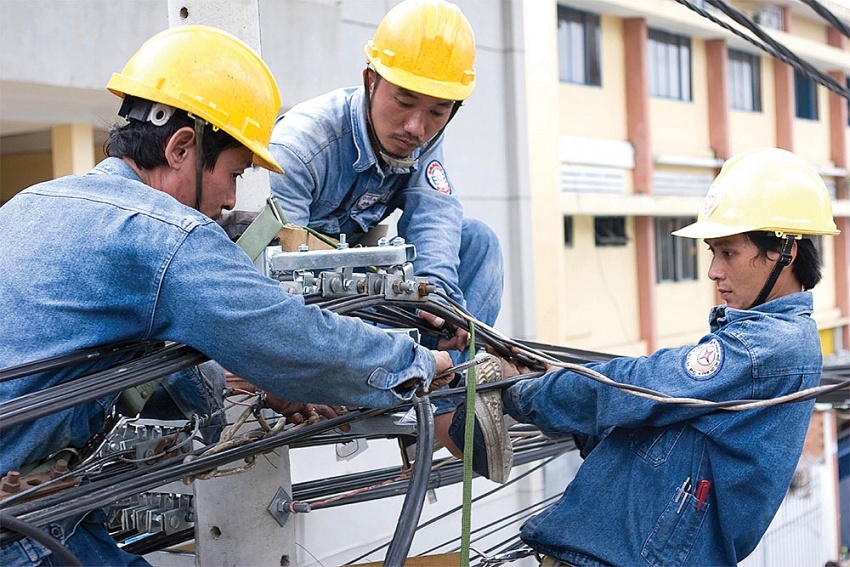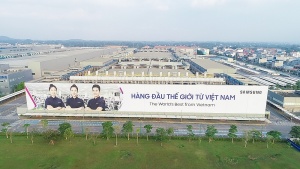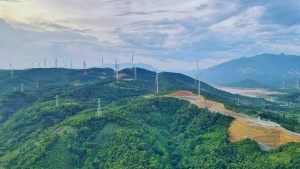DPPA paves the way to energy transition
A direct power purchase agreement (DPPA) plan, agreed on July 9, allows enterprises to sign renewable energy contracts exceeding a certain scale with private producers, not just with state-owned Vietnam Electricity.
 |
| DPPA paves the way to energy transition, Photo Le Toan |
Previously, enterprises mainly procured renewable energy through small-scale solar panels on their sites or by purchasing renewable energy certificates.
This is good news for the community of manufacturers in industrial parks and economic zones because, with the implementation of DPPAs, they will be able to strengthen the institutional foundation for securing renewable energy.
Samsung Electronics has been tirelessly working with various stakeholders, including the Vietnamese government and civil society organisations, to introduce the DPPA system and put climate strategy into practice.
Since the first DPPA discussions began in 2019, Samsung has emphasised the need to introduce a renewable energy procurement mechanism as soon as possible and to be provided with technical advice on how to implement the mechanism.
“Through the DPPA, we plan to get in touch with large-scale renewable energy producers proportionate to the size of operations at Samsung Electronics Vietnam and make competitive purchases of renewable energy,” said executive vice president Joo Ho Choi, general director of Samsung Vietnam Complex. “We will continue to work with the Vietnamese government to advance Vietnam’s renewable energy infrastructure.”
Nguyen Duy Vuong, head of foreign affairs of Heineken Vietnam, said, “To realise the sustainable development strategy, by 2025, all of the company’s products will be produced with renewable energy, as well as without landfill waste. We also want to buy clean electricity directly from renewable energy projects to reduce costs. Thus, the approval of DPPA is excellent news.”
Other electronics giants and global manufacturers such as LG, Foxconn, CJ Vietnam, and OTTOGI are on track to ramp up their energy transition plans in Vietnam. Additionally, manufacturers for Adidas, Nike, and other textile and apparel brands have also recently switched to rooftop solar.
One example is Foxconn, a manufacturer for Apple and other global brands, which successfully operated a 19MWp rooftop solar capacity in the northern province of Bac Giang in June 2023. The company plans to test operate the next batch of rooftop solar systems with a total capacity of 32MWp, accounting for 20 per cent of Foxconn’s current factory roof area in Vietnam.
The company has expanded its operations in Vietnam thanks to favourable economic, political, and social foundations and made rooftop solar an important part of Foxconn’s energy transition in the region.
Chung Dieu Tuan, CEO of CME Solar – a foreign-invested enterprise supported by the Oman Investment Authority, said the demand for rooftop solar installations in the manufacturing sectors of foreign-invested companies in Vietnam, especially the electronics and semiconductor and textile industries, is increasing.
“As part of the global effort to commit to net-zero emissions, international brands and manufacturers in Vietnam need to meet the requirement for energy transition to renewable sources,” Tuan said. “However, the existing rooftop solar energy systems can only provide about 20-30 per cent of actual energy consumption needs. In addition, the seasonal shortage of electricity supply, along with increased electricity demand in commercial/residential areas, causes pressure on production progress in the business community, especially foreign-invested manufacturers.”
Thus, they expect that the Vietnamese government will have many solutions to address this problem so that they can realise their energy transition plans. The foreign-invested business community also participated in dialogue with the government to promote DPPAs, Tuan added.
| By paving the way for foreign-invested enterprises to realise their energy transition plan, the agreement will contribute to realising the goal of renewable energy installation mentioned in Power Development Plan VIII, which was approved in May. The plan places more emphasis on renewable energy development than the previous plan. The goal is to reach the proportion of renewable energy (excluding hydropower) at about 31-39 per cent in the overall energy structure by 2030, equivalent to a capacity of 5,000-10,000MW. In addition, through the Just Energy Transition Partnership with international partners, Vietnam has the ability to increase the above rate to 47 per cent. By 2050, renewable energy is expected to account for 67.5-71.5 per cent of the entire energy system. |
 | Samsung Electronics Vietnam to expand renewable energy procurement Samsung Electronics Vietnam is on track to ramp up its climate action by expanding its procurement of renewable energy. |
 | DPPA approval a win for clean energy The US Department of State’s Bureau of Energy Resources (ENR) applauded the Vietnamese government's approval of a direct power purchase agreement (DPPA) on July 3, a significant milestone towards achieving net-zero emissions by 2050. |
 | Feasibility is a must for successful DPPA mechanism A July government decree permits many kind of renewable energy projects to engage in direct power purchase agreements without using Vietnam Electricity transmission line. Tran Dang Khoi, general director of Hero Future Energies Vietnam LLC under Hero Group, told VIR’s Oanh Nguyen about the impact of the policy on renewable energy firms and offered some proposals. |
What the stars mean:
★ Poor ★ ★ Promising ★★★ Good ★★★★ Very good ★★★★★ Exceptional
Related Contents
Latest News
More News
- $100 million initiative launched to protect forests and boost rural incomes (January 30, 2026 | 15:18)
- Trung Nam-Sideros River consortium wins bid for LNG venture (January 30, 2026 | 11:16)
- Vietnam moves towards market-based fuel management with E10 rollout (January 30, 2026 | 11:10)
- Envision Energy, REE Group partner on 128MW wind projects (January 30, 2026 | 10:58)
- Vingroup consults on carbon credits for electric vehicle charging network (January 28, 2026 | 11:04)
- Bac Ai Pumped Storage Hydropower Plant to enter peak construction phase (January 27, 2026 | 08:00)
- ASEAN could scale up sustainable aviation fuel by 2050 (January 24, 2026 | 10:19)
- 64,000 hectares of sea allocated for offshore wind surveys (January 22, 2026 | 20:23)
- EVN secures financing for Quang Trach II LNG power plant (January 17, 2026 | 15:55)
- PC1 teams up with DENZAI on regional wind projects (January 16, 2026 | 21:18)

 Tag:
Tag:



















 Mobile Version
Mobile Version